1.the concept of utility
大学思辨英语精读Unit1ThinkingSociologically参考答案
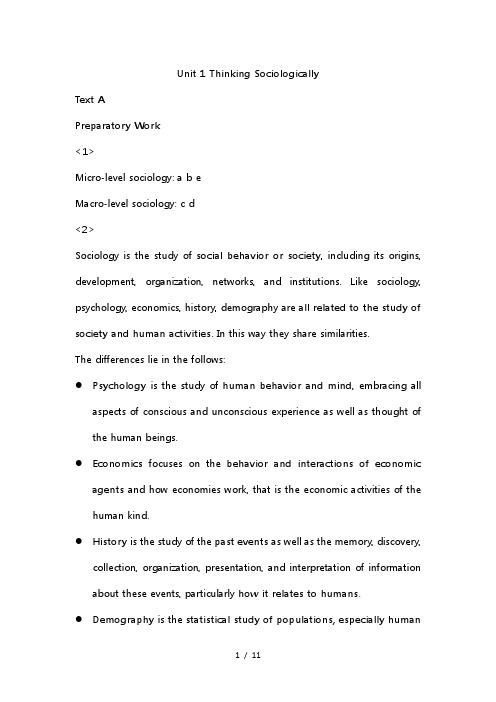
Unit 1 Thinking SociologicallyText APreparatory Work<1>Micro-level sociology: a b eMacro-level sociology: c d<2>Sociology is the study of social behavior or society, including its origins, development, organization, networks, and institutions. Like sociology, psychology, economics, history, demography are all related to the study of society and human activities. In this way they share similarities.The differences lie in the follows:●Psychology is the study of human behavior and mind, embracing allaspects of conscious and unconscious experience as well as thought of the human beings.●Economics focuses on the behavior and interactions of economicagents and how economies work, that is the economic activities of the human kind.●History is the study of the past events as well as the memory, discovery,collection, organization, presentation, and interpretation of information about these events, particularly how it relates to humans.●Demography is the statistical study of populations, especially humanbeings. As a very general science, it can analyze any kind of dynamic living population, i.e., one that changes over time or space.<3> <open>Teaching suggestion:You can refer to the following textbooks:John J. Macionis & Nijole V. Benokraitis ed., Seeing Ourselves 7th ed. <Upper Saddle River, NJ: Pearson Prentice Hall, 2007>James M. Henslin ed., Down to Earth Sociology: Introductory Readings 14th ed. <New York: Free Press, 2007><4> <open>Teaching suggestion:You can refer to the last two parts of the text: "What Work Do Sociologists Do" and "How is Sociology Useful to Me and to the World" <paragraph 19-26> for positive reasons.Negative reasons vary <why not choose a career related to sociology>, for instance, no interest <in social sciences>, character reasons <not cut out for dealing with people>, and practical reason <no high pay>.Critical ReadingI. Understanding the text1.2.<1> To emphasize the importance of sociology and arouse readers’ interest in <studying> sociology.<2>The intended audience of the essay are university and college students. The audience is young and curious about everything but needs some guide in choosing their courses in university study.<3>In Para. 7, Cargan and Ballantine try to demonstrate that sociology isbased on systematic and objective study of human behavior.<4>They illustrate the difference between individual explanation and group explanation using divorce as an example. Individual explanation considers a divorce as a personal problem caused by conflict between the husband and wife within the family. Sociology can help us move beyond "individual" explanations to consider the social surroundings that influence the situation: economic conditions, disruptions caused by changing sex roles, and pressures on the family to meet the emotional needs of its members.<5>We can see that the first list of skills <sociology trains us in> is broader and more general category, and the second list of skills <employers look for> is the overlapping or subcategory of the former list. So we can simply put the skills of the second list into its respective categories in the first list <actually, some of the skills in the second list can be put into two or more general categories in the first list>. Note: this is only one way of reorganize the two lists, and not necessarily the best one.●Ability to view the world more objectively: ability to plan effectively;self-confidence about job responsibilities; ability to listen to others;self-motivation; effective leadership skills●Tools to solve problems by designing studies, collecting data, andanalyzing results: ability to organize thoughts and information; ability to conceptualize problems clearly●Ability to understand group dynamics: ability to work with peers;self-motivation; ability to interact effectively in group situations; ability to listen to others●Ability to understand and evaluate problems: effectiveproblem-solving skills; effective leadership skills;●Ability to understand your personal problems in a broader socialcontext: willingness to adapt to the needs of the organization; ability to handle pressureII. Evaluation and exploration<1> Yes. The title is a question to the key issue of sociology, which is very clear and focused. And the text provides and elaborates the answers to the key question "why study sociology".<2> The introduction is very effective. It starts with six questions about sociology to arouse the readers’ interest or curiosity in this topic.<3> Subtitles in the text are effective and necessary in dividing the text into different but related parts so that the readers can have a clear structural framework about the organization of the text.<4> The benefits of taking sociology described in Para. 13 are grouped intoa general list of five abilities/skills in paragraph 14 and 12 skills in paragraph15. It is not necessary to use examples to illustrate every benefit mentioned in a long list. However, if the authors added some statistics to support the five categories, the argument would be more convincing.<5> The conclusion or statement that "sociology is the broadest of the socialsciences" is reasonable. Cargan and Ballantine described the wide range of areas sociology covers, and other related disciplines that sociology overlaps with, such as socialpsychology, political socioloty, anthropology, and social history.<6> Sociology not only covers vast areas of social studies, but also provides objective perspective and scientific methods in understanding the society and individuals. It also trains us in necessary life and work ability or skills in correctly dealing with issues and problems. In a word, sociology offers us a platform for critical thinking.<7> Sociologists probe into a social phenomenon/problem with scientific methods <group explanation instead of personal/individual one> that the next unit is to discuss in details <they include experiment, survey, participant observation/field work, and available data analysis>.<8> Structural functionalism, or simply functionalism, is a framework for building theory that sees society as a complex system whose parts work together to promote solidarity and stability. This approach looks at society through a macro-level orientation, which is a broad focus on the social structures that shape society as a whole, and believes that society has evolved like organisms. This approach looks at both social structure and social functions. Functionalism addresses society as a whole in terms of the function of its constituent elements, namely norms, customs, traditions, and institutions.●Conflict theories are perspectives in sociology and social psychology thatemphasize the social, political, or material inequality of a social group, that critique the broad socio-political system, or that otherwise detract from structural functionalism and ideological conservatism. Conflict theories draw attention to power differentials, such as class conflict, and generally contrast historically dominant ideologies. It is therefore a macro level analysis of society. Karl Marx is the father of the social conflict theory, which is a component of the four paradigms of sociology.●Symbolic interactionism is a sociological perspective which developedaround the middle of the twentieth century and that continues to be influential in some areas of the discipline. It is particularly important in microsociology and social psychology. Symbolic interactionism is derived from the American philosophy of pragmatism and particularly from the work of George Herbert Mead who coined the term and put forward an influential summary: people act toward things based on the meaning those things have for them, and these meanings are derived from social interaction and modified through interpretation.●Utilitarianism is a theory in normative ethics holding that the best moralaction is the one that maximizes utility. Utility is defined in various ways, but is usually related to the well-being of sentient entities. Originally, Jeremy Bentham, the founder of Utilitarianism, defined utility as the aggregate pleasure after deducting suffering of all involved in any action.John Stuart Mill expanded this concept of utility to include not only the quantity, but quality of pleasure, while focusing on rules, instead of individual moral actions.Language EnhancementI. Words and phrases1.<1> C&D <2> A&C <3> C&D <4> A&C <5> C&D<6>C&E <7> C&D <8> B&C <9> A&E <10> C&F2.(1)单日,单一天(2)单身汉(3)挑选出(4)独立地〔只身(5)通常的,常见的(6)共同的(7)〔英国平民院〔下议院(8)宣判有……罪(9)罪犯(10)逃跑(11)分解(12)闯入(13)中断、暂停(14)爆发(15)解体3.<1> major in <2> curious about <3> interact with <4> relate to <5> engage with<6> lead to <7> specialize in <8> conform to <9> based on <10> refrain from4<1> break away from <2> convict of <3> bond with <4> engage in <5> embark on<6> profit from <7> involved in <8> focus on <9> depended on <10> encounterII. Sentences and discourse1.(1)As you learn more about sociology, you will gradually find the linksbetween its individual and separate parts and see the whole picture of sociology.(2)Sociologists’ interests will immediately aroused by seeing any two ormore people with close relationships.(3)You can ponder over the phenomenon that some societies allow andexpect premarital sex while others punish it with banishment and death.(4)Through systematic scientific study, sociologists can fully understandhuman behavior in groups, which is impossible through mere commonsense.(5)Sociology can help us explain "individual" cases more insightfully bylinking them with the crucial social conditions behind them.2.(1)He majored in chemistry when enrolled in while studying in university.(2)Terrorism poses a threat to many countries.(3)While studying overseas, you must interact more with the localpeople/natives.(4)The corruption of some of this country’s officials has sparked publicresentment and protest.(5)Due to his contribution to the company, he negotiated with his boss andrenewed his contract with better conditions.(6)At the age of 16, she published her first poem and embarked on her longjourney to literature.(7)In the process of translating the Chinese classic Journey to the West intoGerman, he encountered many difficult problems.(8)After arriving in Britain, he took a whole month to adapt to the country’srainy climate.(9)Your company should engage more actively in the environmental projectsof the government.(10)T en years ago, he was convicted of robbery.3.社会学家们的不同兴趣促使他们研究许多不同的领域。
考研英语(翻译)模拟试卷76

考研英语(翻译)模拟试卷76(总分:60.00,做题时间:90分钟)一、 Reading Comprehension(总题数:6,分数:60.00)1.Section II Reading Comprehension(分数:10.00)__________________________________________________________________________________________ 解析:2.Part CDirections: Read the following text carefully and then translate the underlined segments into Chinese.(分数:10.00)__________________________________________________________________________________________ 解析:The technological revolutions of the last two decades have placed a severe burden on the concept of technology transfer. It is quite clear that the concept has serious limitations; with time, it is not at all clear that its methods have improved or its result progressed. 【F1】The underlying assumption in "technology transfer" is that the application of new discoveries to the development of new technology through the developed countries produces results which are applicable to underdeveloped countries. Although this assumption has never really been put to a true global test, it is through now clear that this can not be the main means of technological progress in developing areas such as Africa South East Asian and Latin America, irrespective of its possible utility elsewhere.【F2】 The question is whether such an outcome is inevitable and inherent in the process or whether it merely reflects the shortage of resources and improper management. It is my contention that "technology transfer" as a vehicle of progress for the developing countries is irreparably flawed and cannot succeed. 【F3】The fundamental flaw is that "technology transfer" is cast in the die of a colonial process where through developed countries do things in ways that they find acceptable for their former colonies, the developing countries. Whether the development process is carried out through citizens of the recipient nation or not is irrelevant; the philosophy upon which "technology transfer" is based, beginning with training and ending with application, is composed of a set of socioculturally and economically determined values within the institutionalized fabric of science, which select the questions found to be meaningful, dictate the preferred research plans and evaluate the significance only of the results obtained. Clearly, technology based on the set of determinants is not likely to be very relevant to the vastly different economic and sociocultural conditions of developing countries. It will hardly get to the needs of the developing countries, perhaps even serving to slow progress.【F4】 This situation must be replaced through a new process which might be called "basic knowledge transfer" as part of growth of a forefront science in the developing countries. This approach contains the following features: Given full access to new scientific discovery at the cutting edge of science, that is, at the region of high intensity transfer from basic to applied knowledge, the scientists of developing countries can create their own technology transfer from basic to applied. Scientists in the developing countries, in active dialogue with other elements such as government, community and industry, can identify and prioritize problems and develop a practical situation.【F5】 The problem of internal "technology transfer" will require for each country or region a suitable number of trained scientific specialists; means for maintaining the competency of these leaders will need to be developed through each nation or region.(分数:10.00)(1).【F1】(分数:2.00)__________________________________________________________________________________________ 正确答案:(正确答案:“技术转让”的基本设想是:发达国家利用新发现开发技术会给发展中国家带来可应用的成果。
萨缪尔森

Major Works of Paul A. Samuelson
In international trade theory, he is responsible for the StolperSamuelson Theorem and, independently of Lerner, the Factor Price Equalization theorem (1948, 1949, 1953) as well as (finally) resolving the age-old "transfer problem" relating terms of trade and capital flows a well as the Marxian transformation problem (1971) and other issues in Classical economics (1957, 1978).
Paul A. Samuelson, 1915-
Photo of P.A. Samuelson
Perhaps more than anyone else, Paul A. Samuelson has personified mainstream economics in the second half of the twentieth century. The writer of the most successful principles textbook ever (1948), Paul Samuelson has been not unjustly considered the incarnation of the economics "establishment" and as a result, has been both lauded and vilified for virtually everything right and wrong about it.
无用之用的作文900字
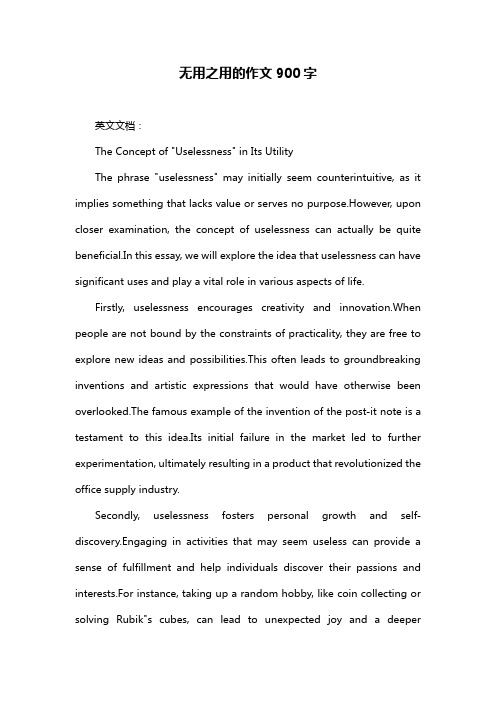
无用之用的作文900字英文文档:The Concept of "Uselessness" in Its UtilityThe phrase "uselessness" may initially seem counterintuitive, as it implies something that lacks value or serves no purpose.However, upon closer examination, the concept of uselessness can actually be quite beneficial.In this essay, we will explore the idea that uselessness can have significant uses and play a vital role in various aspects of life.Firstly, uselessness encourages creativity and innovation.When people are not bound by the constraints of practicality, they are free to explore new ideas and possibilities.This often leads to groundbreaking inventions and artistic expressions that would have otherwise been overlooked.The famous example of the invention of the post-it note is a testament to this idea.Its initial failure in the market led to further experimentation, ultimately resulting in a product that revolutionized the office supply industry.Secondly, uselessness fosters personal growth and self-discovery.Engaging in activities that may seem useless can provide a sense of fulfillment and help individuals discover their passions and interests.For instance, taking up a random hobby, like coin collecting or solving Rubik"s cubes, can lead to unexpected joy and a deeperunderstanding of one"s preferences.It also promotes mindfulness and relaxation, as it allows individuals to step away from the pressure of productivity and simply enjoy the process.Moreover, the concept of uselessness can contribute to a healthier perspective on life.In a world that constantly emphasizes the importance of efficiency and productivity, uselessness serves as a reminder to appreciate the little things in life.It encourages us to find joy in activities that may not have any tangible benefits but bring us happiness and relaxation.This can lead to a more balanced and fulfilling life, as it helps us avoid the burnout that often comes with constantly chasing success and achievement.In conclusion, the concept of uselessness is not as negative as it may seem.On the contrary, it can be a powerful tool that fosters creativity, personal growth, and a healthier perspective on life.By embracing uselessness, we open ourselves up to new possibilities and experiences, ultimately enriching our lives in ways that traditional notions of usefulness cannot.中文文档:“无用之用”的作文900字“无用”这个词语初听之下可能让人感到困惑,因为它意味着缺乏价值或没有实际用途。
微观经济学论文参考文献
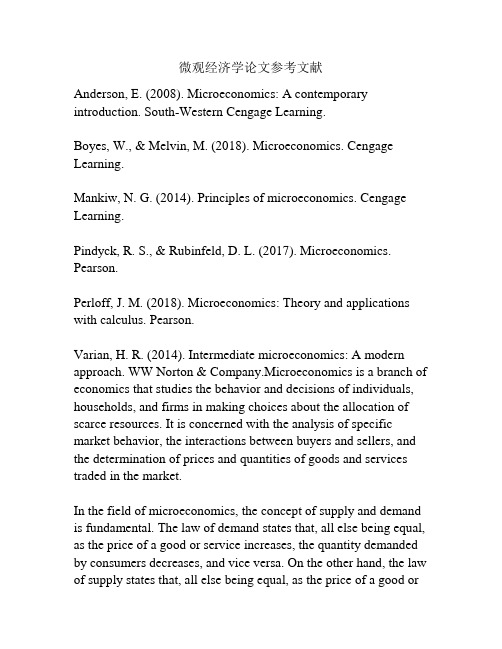
微观经济学论文参考文献Anderson, E. (2008). Microeconomics: A contemporary introduction. South-Western Cengage Learning.Boyes, W., & Melvin, M. (2018). Microeconomics. Cengage Learning.Mankiw, N. G. (2014). Principles of microeconomics. Cengage Learning.Pindyck, R. S., & Rubinfeld, D. L. (2017). Microeconomics. Pearson.Perloff, J. M. (2018). Microeconomics: Theory and applications with calculus. Pearson.Varian, H. R. (2014). Intermediate microeconomics: A modern approach. WW Norton & Company.Microeconomics is a branch of economics that studies the behavior and decisions of individuals, households, and firms in making choices about the allocation of scarce resources. It is concerned with the analysis of specific market behavior, the interactions between buyers and sellers, and the determination of prices and quantities of goods and services traded in the market.In the field of microeconomics, the concept of supply and demand is fundamental. The law of demand states that, all else being equal, as the price of a good or service increases, the quantity demanded by consumers decreases, and vice versa. On the other hand, the law of supply states that, all else being equal, as the price of a good orservice increases, the quantity supplied by producers increases, and vice versa. These two fundamental laws of microeconomics play a crucial role in shaping market equilibrium and understanding market behavior.Another significant concept in microeconomics is the theory of the firm. This theory analyzes the behavior and decisions of individual firms in various market structures. It covers topics such as production and cost analysis, profit maximization, and competitive strategies. The study of market structures, including perfect competition, monopoly, oligopoly, and monopolistic competition, provides insight into how firms interact and compete in different market environments.Furthermore, microeconomics examines the impact of government policies, such as taxes, subsidies, and regulations, on market outcomes. It assesses how these interventions can affect consumer and producer behavior, market efficiency, and social welfare. Understanding the effects of government policies is crucial for policymakers and economists in evaluating the consequences of their decisions on the allocation of resources and the distribution of goods and services in the economy.Moreover, microeconomics delves into the concept of consumer behavior and decision-making. It explores how individuals allocate their income to different goods and services, the factors that influence their choices, and the concept of utility maximization. By understanding consumer preferences and behavior, firms can make informed decisions regarding production, pricing, and marketing strategies.In conclusion, microeconomics is a vital field of study that provides insights into the behavior of individuals, households, and firms in various economic activities. It offers a framework for understanding market dynamics, resource allocation, and the impact of government policies. A solid understanding of microeconomic principles is essential for making informed business decisions, formulating effective policies, and comprehending the functioning of the economy as a whole.。
经济学原理 曼昆 英文
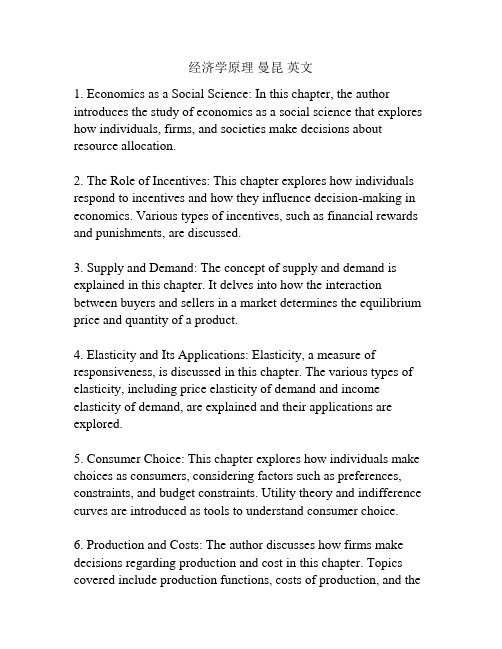
经济学原理曼昆英文1. Economics as a Social Science: In this chapter, the author introduces the study of economics as a social science that explores how individuals, firms, and societies make decisions about resource allocation.2. The Role of Incentives: This chapter explores how individuals respond to incentives and how they influence decision-making in economics. Various types of incentives, such as financial rewards and punishments, are discussed.3. Supply and Demand: The concept of supply and demand is explained in this chapter. It delves into how the interaction between buyers and sellers in a market determines the equilibrium price and quantity of a product.4. Elasticity and Its Applications: Elasticity, a measure of responsiveness, is discussed in this chapter. The various types of elasticity, including price elasticity of demand and income elasticity of demand, are explained and their applications are explored.5. Consumer Choice: This chapter explores how individuals make choices as consumers, considering factors such as preferences, constraints, and budget constraints. Utility theory and indifference curves are introduced as tools to understand consumer choice.6. Production and Costs: The author discusses how firms make decisions regarding production and cost in this chapter. Topics covered include production functions, costs of production, and theconcept of economies of scale.7. Perfect Competition: This chapter explores the characteristics of perfect competition, including the large number of buyers and sellers, homogenous products, and ease of entry and exit. It also examines the implications of perfect competition on market outcomes.8. Monopoly: The concept of monopoly, where a single firm controls the market, is discussed in this chapter. The author analyzes the sources of monopoly power and its implications for prices and output in the market.9. Market Failures and Government Intervention: This chapter examines market failures, situations where the market fails to allocate resources efficiently. Different types of market failures, such as externalities and public goods, are explained, along with the role of government intervention in correcting these failures.10. Externalities: Externalities, or the consequences of economic activities on third parties, are explored in this chapter. The author discusses positive and negative externalities and their implications for resource allocation.11. Public Goods and Common Resources: This chapter focuses on the characteristics of public goods and common resources. It discusses the free-rider problem and the challenges in providing public goods efficiently.12. Markets for Factors of Production: The author explores themarkets for factors of production, including labor and capital, in this chapter. Wage determination, discrimination, and other factors influencing the prices of these factors are analyzed.13. The Economics of Income Inequality: Income inequality and its causes are discussed in this chapter. The author explores different theories and factors that contribute to income inequality, as well as its implications for society and policy considerations.14. The Theory of Consumer Choice: This chapter delves deeper into the theory of consumer choice, examining topics such as consumer preferences, budget constraints, and the concept of utility maximization.15. Frontiers of Microeconomics: The final chapter explores the frontiers of microeconomics, including topics such as behavioral economics, game theory, and the economics of information. The author discusses how these fields have expanded our understanding of economic behavior.。
the greatest pleasure for greatest number

the greatest pleasure for greatest number介绍含译文"The greatest pleasure for the greatest number" is a concept rooted in utilitarianism, a philosophical theory that was popularized by figures like Jeremy Bentham and John Stuart Mill. This concept is often summarized as the principle of utility, which suggests that actions or decisions should be evaluated based on their ability to maximize happiness or pleasure and minimize suffering or pain for the largest number of people.Key points related to this concept include:1. Utility: In utilitarianism, the term "utility" is used to represent the overall well-being or happiness derived from a particular action, decision, or policy. It is often measured in terms of pleasure and the absence of pain or suffering.2. Greatest Number: The principle emphasizes that the moral or ethical course of action is the one that leads to the greatest overall happiness or pleasure for the greatest number of people. In other words, it seeks to maximize the collective welfare.3. Calculating Consequences: Utilitarians typically assess the consequences of an action or decision in terms of how it affects the well-being of individuals. They weigh the positive and negative outcomes and choose the action that provides the greatest net benefit in terms of happiness.4. Cost-Benefit Analysis: Utilitarianism encourages a kind of cost-benefit analysis, where the benefits of an action are compared to its costs and potential harms. The aim is to select actions that result in the greatest net gain in utility.5. Ethical Implications: Utilitarianism has been applied to various ethical dilemmas and public policy issues. It can guide decisions in areas such as healthcare, economics, environmental ethics, and more. Critics argue that it may sometimes lead to morally questionable actions if the majority's pleasure is prioritized at the expense of a minority's suffering.6. Rule Utilitarianism vs. Act Utilitarianism: There are variations of utilitarianism. Act utilitarianism focuses on assessing individual actions, while rule utilitarianism evaluates actions based on adherence to rules or principles that, when followed, generally maximize overall happiness.It's important to note that utilitarianism is just one of many ethical theories, and it has been the subject of significant debate and criticism. Some critics argue that it can lead to morally problematic conclusions, especially in situations where the majority's happiness conflicts with the rights or well-being of a minority. Nevertheless, the principle of "the greatest pleasure for the greatest number" remains a fundamental idea within utilitarian ethics.译文:“最大多数人的最大快乐”是一个植根于功利主义的概念,功利主义是一种由杰里米·边沁和约翰·斯图尔特·穆勒等人推广的哲学理论。
丢弃不想要的东西丢失了宝贵的东西的英语
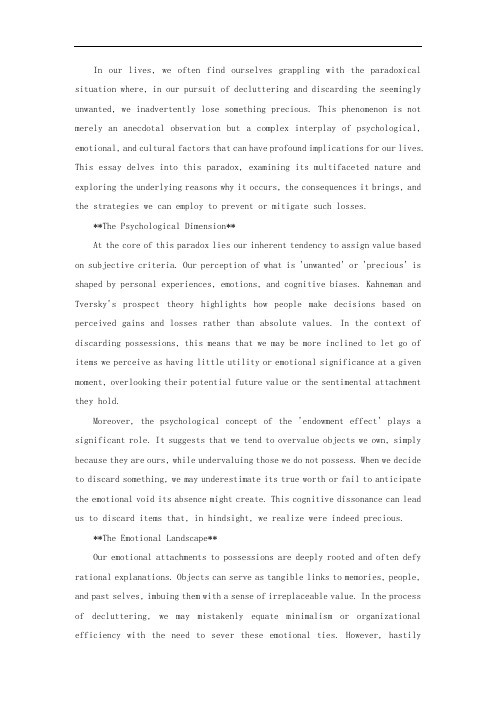
In our lives, we often find ourselves grappling with the paradoxical situation where, in our pursuit of decluttering and discarding the seemingly unwanted, we inadvertently lose something precious. This phenomenon is not merely an anecdotal observation but a complex interplay of psychological, emotional, and cultural factors that can have profound implications for our lives. This essay delves into this paradox, examining its multifaceted nature and exploring the underlying reasons why it occurs, the consequences it brings, and the strategies we can employ to prevent or mitigate such losses.**The Psychological Dimension**At the core of this paradox lies our inherent tendency to assign value based on subjective criteria. Our perception of what is 'unwanted' or 'precious' is shaped by personal experiences, emotions, and cognitive biases. Kahneman and Tversky's prospect theory highlights how people make decisions based on perceived gains and losses rather than absolute values. In the context of discarding possessions, this means that we may be more inclined to let go of items we perceive as having little utility or emotional significance at a given moment, overlooking their potential future value or the sentimental attachment they hold.Moreover, the psychological concept of the 'endowment effect' plays a significant role. It suggests that we tend to overvalue objects we own, simply because they are ours, while undervaluing those we do not possess. When we decide to discard something, we may underestimate its true worth or fail to anticipate the emotional void its absence might create. This cognitive dissonance can lead us to discard items that, in hindsight, we realize were indeed precious.**The Emotional Landscape**Our emotional attachments to possessions are deeply rooted and often defy rational explanations. Objects can serve as tangible links to memories, people, and past selves, imbuing them with a sense of irreplaceable value. In the process of decluttering, we may mistakenly equate minimalism or organizational efficiency with the need to sever these emotional ties. However, hastilydiscarding items that carry emotional weight can result in feelings of regret, sadness, or even grief, as we realize the depth of the connection we had with them.Furthermore, the pressure to conform to societal norms or trends, such as the popular 'minimalist lifestyle,' can drive us to discard items prematurely. We may feel compelled to rid ourselves of belongings that do not align with this idealized vision, overlooking the fact that these possessions might hold unique and personal significance. This external influence can cloud our judgment, leading us to dispose of precious items in the guise of discarding the unwanted.**Cultural Influences and Materialism**Culture plays a pivotal role in shaping our attitudes towards material possessions and our understanding of what constitutes 'precious.' In consumerist societies, where material possessions are often seen as markers of status, success, or personal identity, the risk of mistaking the precious for the unwanted is heightened. The constant influx of new products and the allure of novelty can make us insensitive to the intrinsic value of our existing possessions, causing us to discard them prematurely in pursuit of the latest trends.On the other hand, in cultures that place greater emphasis on frugality, conservation, or historical preservation, there may be a stronger inclination to cherish and preserve objects, regardless of their immediate practical utility. This cultural context can provide a counterbalance to the tendency to discard too readily, fostering a deeper appreciation for the potential long-term value and sentimental significance of possessions.**Mitigating the Losses: Strategies and Reflections**To navigate this paradox effectively, it is crucial to adopt a mindful and holistic approach to decluttering. This involves:1. **Embracing Emotional Awareness:** Recognizing and honoring the emotional connections we have with our possessions. Before discarding an item, we should reflect on the memories, stories, or people associated with it,allowing us to make more informed decisions about its true value.2. **Practicing Patience and Proportionality:** Rather than succumbing to the urge for instant gratification or adhering rigidly to minimalist ideals, we should approach decluttering as a gradual process. Allowing ourselves time to reflect on each item and considering alternatives to outright disposal, such as donating, repurposing, or storing, can help prevent hasty decisions.3. **Cultivating Critical Thinking:** Challenging societal norms and commercial pressures that may influence our decluttering choices. We should critically assess the true value of our possessions based on our individual needs, values, and aspirations, rather than external standards.4. **Fostering a Conservation Mindset:** Embracing a culture that values sustainability, preservation, and the intrinsic worth of objects beyond their immediate utility. This could involve learning about repair, restoration, and upcycling techniques, or supporting initiatives that promote a circular economy.In conclusion, the paradox of discarding the unwanted and losing the precious is a complex and pervasive phenomenon that stems from our psychological biases, emotional attachments, cultural influences, and relationship with material possessions. To navigate this paradox successfully, we must cultivate mindfulness, critical thinking, and a deep appreciation for the multidimensional value of our possessions. By doing so, we can ensure that our quest for simplicity and order does not come at the cost of irretrievably losing what is truly precious to us.。
利益最大化 英语

利益最大化英语Maximizing UtilityIn the realm of economics and decision-making, the concept of utility maximization has long been a fundamental principle. The idea is that individuals and entities seek to make choices that will bring them the greatest possible benefit or satisfaction, given the constraints and resources they face. This principle underpins much of our understanding of human behavior and the functioning of markets and organizations.At its core, utility maximization rests on the assumption that people are rational actors, seeking to optimize their own well-being. When faced with a decision, the individual is presumed to weigh the potential costs and benefits of each option, and then select the course of action that will yield the greatest net positive outcome. This could mean choosing the product or service that provides the highest quality or value for the lowest price, or it could involve investing in the financial instrument or business venture that promises the highest returns.Of course, the reality of human decision-making is often more complex than this simplified model. People may be influenced by emotions, biases, and other non-rational factors that can lead them to make choices that do not necessarily maximize their utility. Additionally, the information available to decision-makers is often incomplete or uncertain, making it challenging to accurately predict the outcomes of their choices.Despite these limitations, the principle of utility maximization remains a powerful tool for understanding and predicting human behavior. By analyzing the incentives and constraints facing individuals and organizations, economists and other social scientists can gain insights into the factors that drive decision-making and the resulting patterns of resource allocation and market dynamics.One area where the concept of utility maximization has been particularly influential is in the field of microeconomics. Here, the theory of consumer behavior posits that individuals seek to maximize their utility by consuming a combination of goods and services that provides the greatest satisfaction, given their budget constraints. This model helps to explain patterns of consumer demand and the ways in which prices, incomes, and other factors influence purchasing decisions.Similarly, in the realm of business and organizational management, the principle of utility maximization has been applied to the decisions made by firms and other entities. Firms are assumed to seek to maximize their profits or other measures of financial performance, subject to the constraints of technology, competition, and regulatory environments. This framework has been used to analyze a wide range of business decisions, from pricing and production strategies to mergers and acquisitions.Of course, the application of utility maximization extends beyond the purely economic realm. In the field of public policy, for example, policymakers often seek to implement policies and programs that will maximize the overall well-being of society, taking into account a range of social, environmental, and economic factors. This can involve complex trade-offs and the need to balance the interests of different stakeholders.Similarly, in the realm of personal decision-making, individuals may seek to maximize their own utility by making choices that align with their values, goals, and priorities. This could involve decisions about career paths, lifestyle choices, or personal relationships, among other areas.Ultimately, the principle of utility maximization is a powerful tool for understanding and predicting human behavior, but it is not withoutits limitations. As we have seen, real-world decision-making is often more complex and nuanced than the simplified models of economic theory. Nevertheless, the concept remains a valuable framework for analyzing and understanding the choices and behaviors of individuals, organizations, and societies.As we continue to grapple with the challenges and complexities of the modern world, the principle of utility maximization will likely remain a key focus of research and debate. By deepening our understanding of the factors that drive decision-making and resource allocation, we may be better equipped to navigate the tradeoffs and uncertainties that we face, and to strive towards the greatest possible benefit for all.。
utility 单词分解

utility 单词分解单词"utility"(实用性)是一个非常常见的英语单词,具有多重含义和用法。
本文将对该单词进行分解,解释其不同的意义并提供相关的例子。
1. 名词意义:1.1 公共事业:utility 在这个意义上,指的是供公众使用的基础设施或服务,通常由政府或国家管理。
例如,水、电、天然气和通讯服务等都属于公共事业领域的 utility。
公共事业服务的稳定性和可靠性对于社会的正常运转至关重要。
1.2 效用;实用性:utility 可以指某物或某事的效用,也就是其在解决问题或满足需要方面的实际用途。
在经济学中,效用是指个人对一种商品或服务的满足程度。
例如,一台洗衣机的效用在于提供清洁衣物的功能。
2. 形容词意义:2.1 实用的;有用的:作为形容词,utility 描述某物或某事在满足需求或解决问题方面的实际用途。
例如,一把多功能的工具刀在野外旅行中非常实用。
2.2 公共事业的:utility 也可以形容与公共事业相关的设施或服务。
例如,公共供水系统或公共电力网。
3. 财务意义:3.1 公共事业公司:在财务领域中,utility 也指的是公共事业公司,这种公司通常是一种公共事业的经营者。
公共事业公司主要提供诸如水、电和煤气等服务。
3.2 效用函数:在经济学领域,utility 函数是用来衡量个人对各种商品或服务的偏好程度的函数。
经济学家使用效用函数来分析个人购买决策和消费模式。
4. 计算机科学意义:4.1 实用程序:utility 在计算机科学领域中,指的是实用程序(utility program),也被称为实用工具(utility tool),用于执行特定任务或提供特定服务的计算机程序。
例如,杀毒软件、文件压缩工具等。
4.2 工具软件:utility 还可以特指用于辅助管理和优化计算机硬件和软件的工具软件。
例如,硬盘清理程序或系统性能优化工具。
总结:单词"utility"具有多重含义和用法,包括名词和形容词意义,涵盖了公共事业、效用、实用性、财务和计算机科学等领域。
效用价值论,英语
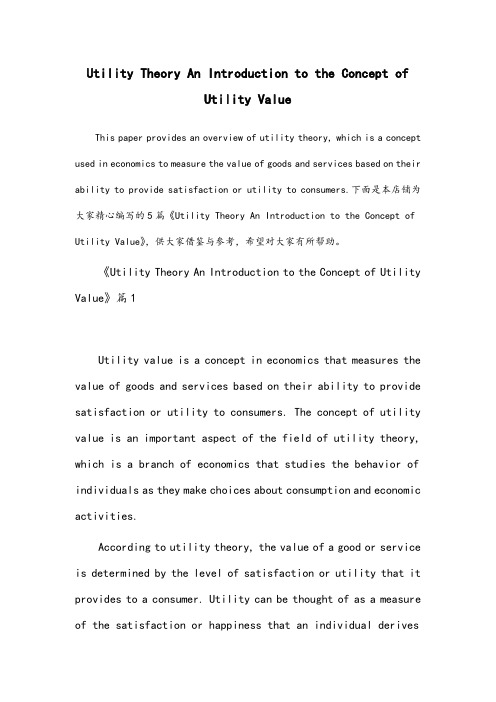
Utility Theory An Introduction to the Concept ofUtility ValueThis paper provides an overview of utility theory, which is a concept used in economics to measure the value of goods and services based on their ability to provide satisfaction or utility to consumers.下面是本店铺为大家精心编写的5篇《Utility Theory An Introduction to the Concept of Utility Value》,供大家借鉴与参考,希望对大家有所帮助。
《Utility Theory An Introduction to the Concept of Utility Value》篇1Utility value is a concept in economics that measures the value of goods and services based on their ability to provide satisfaction or utility to consumers. The concept of utility value is an important aspect of the field of utility theory, which is a branch of economics that studies the behavior of individuals as they make choices about consumption and economic activities.According to utility theory, the value of a good or service is determined by the level of satisfaction or utility that it provides to a consumer. Utility can be thought of as a measure of the satisfaction or happiness that an individual derivesfrom consuming a particular good or service. For example, the utility value of a sandwich may be high for someone who is hungry, while the utility value of a new car may be high for someone who needs transportation to get to work.Utility value is different from market value, which is the price that a good or service commands in a market. Market value is determined by supply and demand, while utility value is determined by the individual"s subjective feelings of satisfaction or utility. For example, a bottle of water may have a market value of $1, but its utility value to a person who is thirsty may be much higher.Utility theory assumes that individuals are rational and make choices that maximize their utility or satisfaction. This assumption forms the basis for the rational choice theory, which is a branch of utility theory that studies the decision-making process of individuals.Utility theory has important implications for policy makers and businesses. For example, policy makers can use utility theory to measure the effectiveness of a particular policy in terms of the utility it provides to consumers. Businesses can use utility theory to understand the demand for their products and to design products that meet the needs ofconsumers.Overall, utility theory is an important concept in economics that helps to explain the behavior of individuals as they make choices about consumption and economic activities. By understanding utility value, we can better understand the choices that people make and design policies and products that meet their needs.《Utility Theory An Introduction to the Concept of Utility Value》篇2Utility Theory: An Introduction to the Concept of Utility ValueUtility theory is a branch of economics that focuses on the study of consumer behavior and the allocation of resources. The concept of utility value is a key component of utility theory, which posits that individuals make decisions based on the utility, or satisfaction, they derive from consuming goods and services. This theory helps to explain why people choose certain goods over others and how they allocate their resources in a manner that maximizes their overall utility or satisfaction.The concept of utility value is subjective, meaning thatit varies from individual to individual based on their preferences, needs, and desires. For example, one person may derive great utility from listening to music, while another may find watching movies more enjoyable. This subjectivity is important to understand when studying consumer behavior, as it helps to explain why people make the choices they do.In utility theory, the concept of utility value is measured in terms of units called utils. These units are used to quantify the amount of satisfaction or utility an individual derives from consuming a particular good or service. The utils are then used to create a utility function, which represents the relationship between the quantity of a good or service consumed and the total utility derived from it.One of the key principles of utility theory is the law of diminishing marginal utility. This law states that as an individual consumes more of a particular good or service, the marginal utility, or additional satisfaction derived from consuming each additional unit, decreases. For example, the first piece of cake may provide a person with a high level of satisfaction, but as they continue to consume more slices, the satisfaction derived from each additional slice decreases. Utility theory also helps to explain why people are willingto pay different prices for different goods and services. The theory posits that individuals are willing to pay more for goods and services that provide them with a higher level of utility or satisfaction. This is because individuals value goods and services based on the satisfaction they provide, and they are willing to pay more to obtain a higher level of satisfaction. Overall, utility theory provides a useful framework for understanding consumer behavior and the allocation of resources. By focusing on the concept of utility value and the law of diminishing marginal utility, utility theory helps to explain why people make the choices they do and why they are willing to pay different prices for different goods and services.《Utility Theory An Introduction to the Concept of Utility Value》篇3效用理论是一种经济学理论,旨在解释人们在做出决策时如何衡量和比较不同行动的效益。
utility 的用法和短语
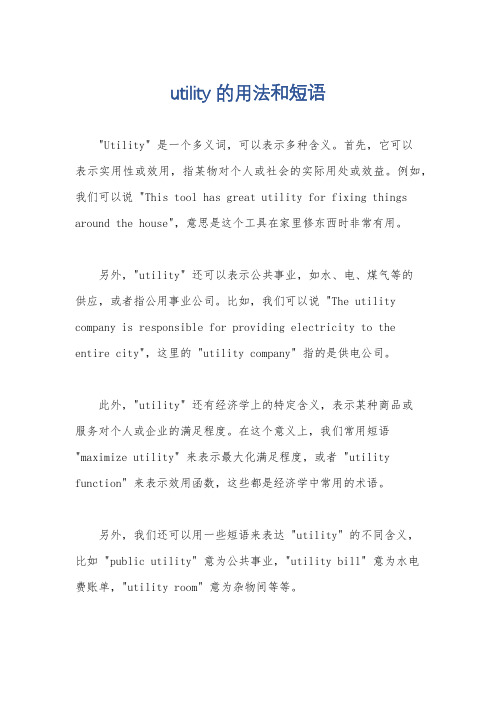
utility 的用法和短语"Utility" 是一个多义词,可以表示多种含义。
首先,它可以表示实用性或效用,指某物对个人或社会的实际用处或效益。
例如,我们可以说 "This tool has great utility for fixing things around the house",意思是这个工具在家里修东西时非常有用。
另外,"utility" 还可以表示公共事业,如水、电、煤气等的供应,或者指公用事业公司。
比如,我们可以说 "The utility company is responsible for providing electricity to the entire city",这里的 "utility company" 指的是供电公司。
此外,"utility" 还有经济学上的特定含义,表示某种商品或服务对个人或企业的满足程度。
在这个意义上,我们常用短语"maximize utility" 来表示最大化满足程度,或者 "utility function" 来表示效用函数,这些都是经济学中常用的术语。
另外,我们还可以用一些短语来表达 "utility" 的不同含义,比如 "public utility" 意为公共事业,"utility bill" 意为水电费账单,"utility room" 意为杂物间等等。
总的来说,"utility" 这个词在不同的语境下有不同的含义和用法,可以根据具体语境来理解和运用。
expected utility
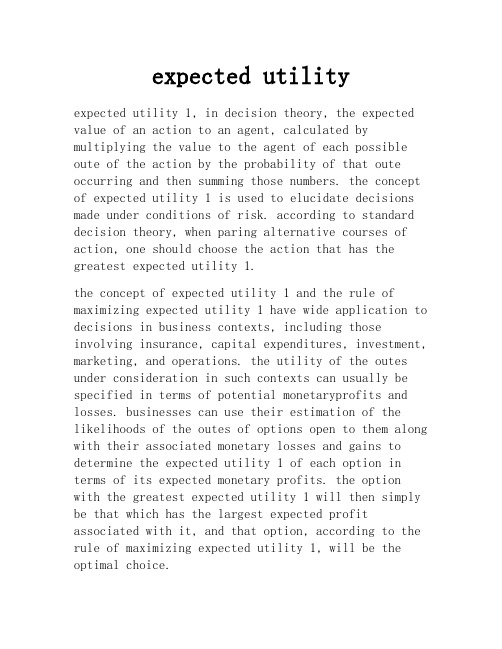
expected utilityexpected utility 1, in decision theory, the expected value of an action to an agent, calculated by multiplying the value to the agent of each possible oute of the action by the probability of that oute occurring and then summing those numbers. the concept of expected utility 1 is used to elucidate decisions made under conditions of risk. according to standard decision theory, when paring alternative courses of action, one should choose the action that has the greatest expected utility 1.the concept of expected utility 1 and the rule of maximizing expected utility 1 have wide application to decisions in business contexts, including those involving insurance, capital expenditures, investment, marketing, and operations. the utility of the outes under consideration in such contexts can usually be specified in terms of potential monetaryprofits and losses. businesses can use their estimation of the likelihoods of the outes of options open to them along with their associated monetary losses and gains to determine the expected utility 1 of each option in terms of its expected monetary profits. the option with the greatest expected utility 1 will then simply be that which has the largest expected profit associated with it, and that option, according to the rule of maximizing expected utility 1, will be the optimal choice.although the concept of expected utility 1 has played an important role in the study of economic behaviour, criticisms have been raised concerning its application to contexts of choice in business and economics. for instance, some theorists from the social and behavioral sciences argue that the cognitivelimitations of human beings make the concept of expected utility 1 as a guide to choice too idealized for use in most significant decision contexts. such critics thus advocate notions of bounded rationality that are more sensitive to those limitations and make use of evaluative concepts that do not depend on the precise sorts of assessments that are involved in determinations of expected utility 1. other critics have argued that the application of expected utility 1 to economic decisions, including policy decisions, has engendered inappropriate valuations, particularly in cases in which monetary units are used to scale the utility of nonmonetary outes, such as potential deaths or damage to the environment.many philosophers have questioned whether the rule of maximizing expected utility 1 represents an adequate or plete guide to decisions, particularly with regard to decisions of an ethical nature. the rule of maximizing expected utility 1 represents a consequentialist form of reasoning, in which actions are judged solely in terms of their potential outes. as such, philosophers of a deontological orientation question whether such reasoning can provide an adequate account of the role of rights and duties inpractical reasoning. such philosophers argue, for instance, that the moral rights of those affected by an action place constraints on the worthiness of a choice independent of the value of the consequences of that choice.。
消费者需求分析

一类是由于极端的癖好产生的。
边
如嗜酒如命的人。他每一次喝酒都
际 效
是越喝越高兴。
用
另一类是由于成套性产生的。
递 减
如集邮爱好者手中的某套邮票尚缺 规
一张,当最后收集到这张邮票时,
律 的
这张邮票比那套邮票中其他各张的 例
效用都要大。
外
3.边际效用递减规律与需求定理
(Law Of Diminishing Utility and Principle of Demand): 购买→效用<>货币支出,在收入固定条件下 ,U/每单位货币相等的。 P以边际MU效用为标准,若MU↑→P↑; 相反若MU↓→P↓
曲线接近于直角线的向右下方倾斜的曲线。
(2)完全替代品的无差异曲线
(3)对好事和坏事的差异曲线
M
I2
I1
O
S
(4)中性商品的无差异曲线
Y I1 I2
O
X
5、个人最佳购买行为:( Consumption Behavior)
(1)消费可能线(ConsumptionPossibility Line)
这是因为一定的无差异曲线是在一定的收入和价 格水平下得出的。如果消费者的收入与商品的价格不 同,就可以有其它组合方式,从而可以产生若干条不 同的不满差异曲线。无同的无差异曲线代表不同的满 足程度。
2、无差异曲线特征(Characteristic)
(3)在同一平面上,任意两条无差 异曲线不可能相交。 (4)无差异曲线总是凸向座标原点 。这一标点要通过;边际替代率加以 说明。
O
X
2、无差异曲线特征( Characteristic)
(1)无差异曲线是向下方倾斜的,其斜 率为负。
utility专业术语翻译
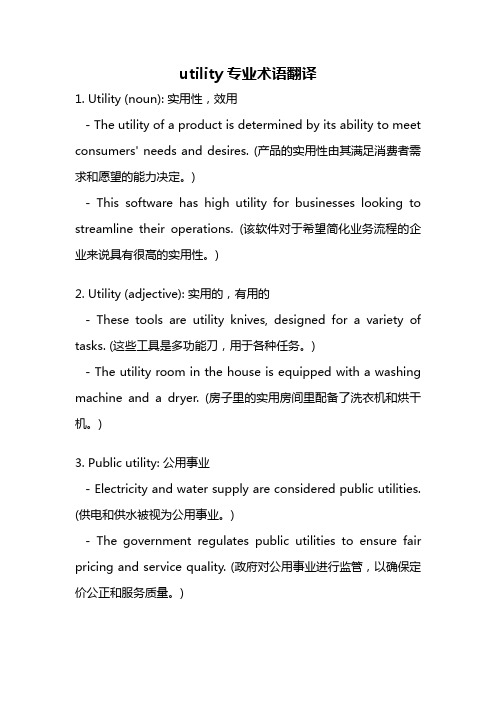
utility专业术语翻译1. Utility (noun): 实用性,效用- The utility of a product is determined by its ability to meet consumers' needs and desires. (产品的实用性由其满足消费者需求和愿望的能力决定。
)- This software has high utility for businesses looking to streamline their operations. (该软件对于希望简化业务流程的企业来说具有很高的实用性。
)2. Utility (adjective): 实用的,有用的- These tools are utility knives, designed for a variety of tasks. (这些工具是多功能刀,用于各种任务。
)- The utility room in the house is equipped with a washing machine and a dryer. (房子里的实用房间里配备了洗衣机和烘干机。
)3. Public utility: 公用事业- Electricity and water supply are considered public utilities. (供电和供水被视为公用事业。
)- The government regulates public utilities to ensure fair pricing and service quality. (政府对公用事业进行监管,以确保定价公正和服务质量。
)4. Utility function: 效用函数- In economics, a utility function is used to model an individual's preferences. (在经济学中,效用函数用于建模个体的偏好。
君子当器作文分论点

君子当器作文分论点(中英文版)英文:In discussing the concept of a gentleman, it is imperative to delve into the aspect of utility.A gentleman, in essence, is one who embodies the ideal blend of refinement and practicality.To elaborate, a gentleman is not merely one who is adorned in fine attire and possesses etiquette, but also one who possesses the ability to adapt and apply his knowledge and skills effectively in various situations.中文:在讨论君子这一概念时,深入探讨其器用性方面至关重要。
君子,本质上,是精致与实用主义理想融合的化身。
具体来说,君子不仅仅是指身着华服、拥有礼仪之人,更是指能够适应各种场合,有效运用其知识和技能的人。
英文:Furthermore, a gentleman is one who recognizes the importance of continuous self-improvement.He understands that knowledge and skills are not ends in themselves, but rather tools for personal growth and betterment.This implies that a gentleman is not only focused on the acquisition of knowledge, but also on the application and refinement of it.中文:此外,君子还认识到不断自我提升的重要性。
- 1、下载文档前请自行甄别文档内容的完整性,平台不提供额外的编辑、内容补充、找答案等附加服务。
- 2、"仅部分预览"的文档,不可在线预览部分如存在完整性等问题,可反馈申请退款(可完整预览的文档不适用该条件!)。
- 3、如文档侵犯您的权益,请联系客服反馈,我们会尽快为您处理(人工客服工作时间:9:00-18:30)。
The Concept of Utility
Economists first began to analyze consumer behavior over a century ago when it was fashionable in psychological circles, to assert that much of human behavior could be explained by people’s desire to realize as much “pleasure” and to avoid as much “pain ” as possible. The pleasure-pain doctrine was quickly borrowed by economists and applied to the sphere of consumer expenditures, and it became the first systematic theory of motivated consumer behavior; the basic economic thesis was that rational consumers would, quite intentionally, manage their purchases of goods and services so as to realize the greatest possible amount of overall total “satisfaction.” Economists labeled the want-satisfying power of goods and services as “utility.”
The concept of utility refers to the pleasure or satisfaction associated with having, using, consuming, or benefiting from goods or services. The utility inherent in a good or service derives from whatever qualities it has that gives it want-satisfying capabilities. The sources and causes of utility are legion: better health, esthetic beauty or design, ease of use, flavor and taste, durability, convenience, luxury, comfort, a sense of individuality, pleasure, prestige, status, pride, security, ego gratification, and power—to mention the most obvious. Hence, utility has both objective and subjective features and, most particularly, utility is a matter of individual taste, preference, perception, personality makeup and state of mind.
As a consequence, the utility that a good possesses or is perceived to possess is variable, not absolute, in the first place, no two people necessarily will view a good as having the same degree of want-satisfying powers—one finds them distasteful; Cadillacs may be important status symbols to some people(and hence have great utility), ye have little or no appeal to other people. Different people buy the same product for quite different uses and motivations. Peanuts, for instance, are bought by some people to serve at cocktail parties, by others to make peanut brittle, and by some to feed to squirrels, with potentially different utilities to each buyer in each case. Moreover, the utility of a good can vary from time to time, or place to place. Rising gasoline prices quickly modified the utility many people placed on small cars. Wool clothing does not have the same utility or want-satisfying powers for people living in short-winter climates as for those living in long-winter climates. But irrespective of the wide variations that different persons may place on the utility of a good or service, the utility concept offers a purposeful basis for establishing consumer preferences for what and how much they will purchase because it leads to comparisons of the amounts of satisfaction received from different consumption rates of different goods and services.
It is, of course, doubtful that the intensity of satisfaction one gains from an item can be represented precisely in cardinal rankings whereby numerical values are assigned to represent util ity. One may say that ”broiled lobster is my favorite food” or “I enjoy broiled lobster more that any other seafood or meat”; but if asked “how much do you enjoy broiled lobster?” one can scarcely reply “about 17” and expect to convey understanding. The subjective nature of the utility concept is, however, susceptible to ordinal ranking measure. In ordinal preference patterns, one only has to be able to rank alternatives—from highest to lowest, best to worst, or most satisfying to least satisfying; no attempt is made to quantify the amount by which one alternative is better (or worse ) than others.
Despite the fact that utility is not subject to precise quantification, it is still analytically useful to assume that utility can be represented by cardinal numbers. Doing so makes it easier to illuminate several important aspects of consumer behavior.。
